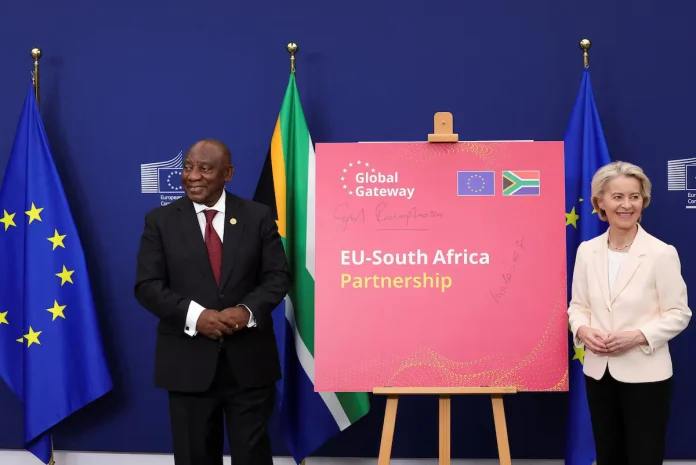The European Union (EU) has announced an €11.5 billion (approximately $13.3 billion) investment package for South Africa, targeting clean energy, infrastructure, and pharmaceutical development.
The pledge, made late Thursday, represents a major boost to Africa’s most industrialised economy as it seeks to revitalise growth and tackle high unemployment.
A significant portion of the investment will support South Africa’s transition to renewable energy, funding new power generation capacity, electricity grid upgrades, energy storage systems, and green hydrogen projects.
The EU highlighted the Coega Green Ammonia Project, a flagship initiative designed to meet the rising global demand for green ammonia across agriculture, chemicals, and mining sectors.
The investment will also strengthen local pharmaceutical production, enabling South Africa to manufacture vaccines and other essential medicines for distribution across the African continent.
European Commission President Ursula von der Leyen had earlier pledged €4.7 billion during a March visit to South Africa. It remains unclear whether the latest commitment includes that amount or is an additional package.
South Africa’s economy, already facing sluggish growth, has recently been hit by U.S. tariffs. In August, President Donald Trump imposed a 30% tariff on South African goods on August 7 and 8, dealing a blow to the country’s export sector. The situation worsened when the African Growth and Opportunity Act (AGOA) expired on September 30, ending decades of preferential trade access to U.S. markets.
South African officials are currently engaged in talks with Washington, hoping to persuade the Trump administration to reduce the tariff and ease the pressure on exporters.
The EU’s multibillion-euro pledge signals strong international confidence in South Africa’s clean energy ambitions and industrial potential. With the investment, the country aims to decarbonise its energy sector, create new jobs, and position itself as a key player in Africa’s green transition.
Source: newsghana.com.gh










